Glashütte Original Senator Chronometer (Incl. Glashütte’s History of Marine Chronometers)
Honouring Glashütte’s history of marine chronometers, the GO model with German chronometry status is decked out with a handsome blue dial.
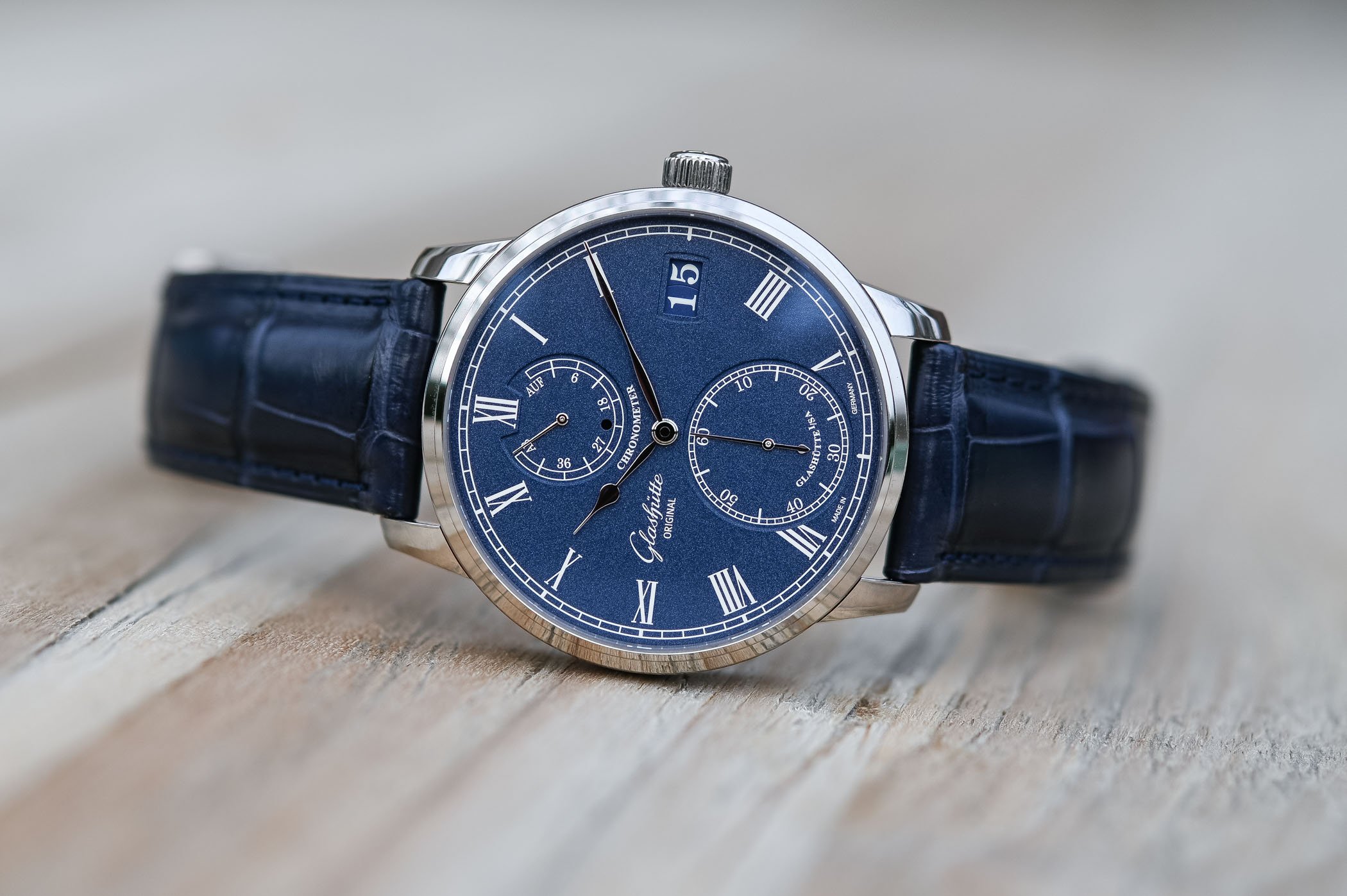
Marine chronometers were a staple of Glashütte’s watchmaking industry for over a century. To honour this tradition, Glashütte Original introduced the Senator Chronometer watch in 2009. Not only does the Senator Chronometer evoke the layout of historic marine chronometers but it was also the first Glashütte Original watch to flaunt official chronometer status. As an heir to the proud tradition of marine chronometers built in Glashütte, precision is the name of the game and the ingenious stop-second/reset mechanism is designed for hyper-precision time setting. The Senator Chronometer was revisited in 2016 in this 42mm white gold and dark blue dial version (see the older version here) proving that historic designs can transcend time and look completely at ease – and remarkably elegant – in the 21st century.
Marine Chronometers from Glashütte
Determining longitude was vital for seafaring nations and observatories in Paris (1667) and Greenwich (1675) were set up to solve the problem of establishing the exact position of a ship at sea. It was not until British carpenter-turned-clockmaker John Harrison perfected his marine chronometer (resulting in the H4 model of 1761 that finally won the Board of Longitude’s Prize money) that navigation at sea became more precise and less perilous. With Dresden’s proud tradition of scientific observation watches, it was hardly surprising that the founding fathers of Glashütte’s watchmaking industry in the 19th century were inspired to produce German precision timekeeping instruments on a more industrial scale.

During a talk given at the Horological Society of New York in 2017, guest speaker Ulrike Kranz (corporate communications for Glashütte Original) underlined the prominence Glashütte attained in the production of marine chronometers. “With the founding of the German Empire in 1871 and growing interest in international trade, the German Navy became more and more important to the German government. To reduce reliance on English imports (including the well-known English marine chronometers), significant support was provided to encourage the production of marine chronometers in Germany. In 1886 the first marine chronometers from Glashütte were sent to the German Naval Observatory in Hamburg for testing.”
The production of marine chronometers in Glashuette started in the year 1886 and continued in the VEB Glashütter Uhrenbetriebe (“GUB”) from 1951 on. Between the years 1886 and 1978 Mechanical marine chronometers were produced and between the years 1974 and 1992 also Quartz marine chronometers were produced. In total, the GUB produced around 5,500 quartz marine chronometers and around 8,000 mechanical marine chronometers. (Regarding the mechanical marine chronometers there are serial numbers starting with number 1 and the production stopped with the number 13190 in the year 1978.)
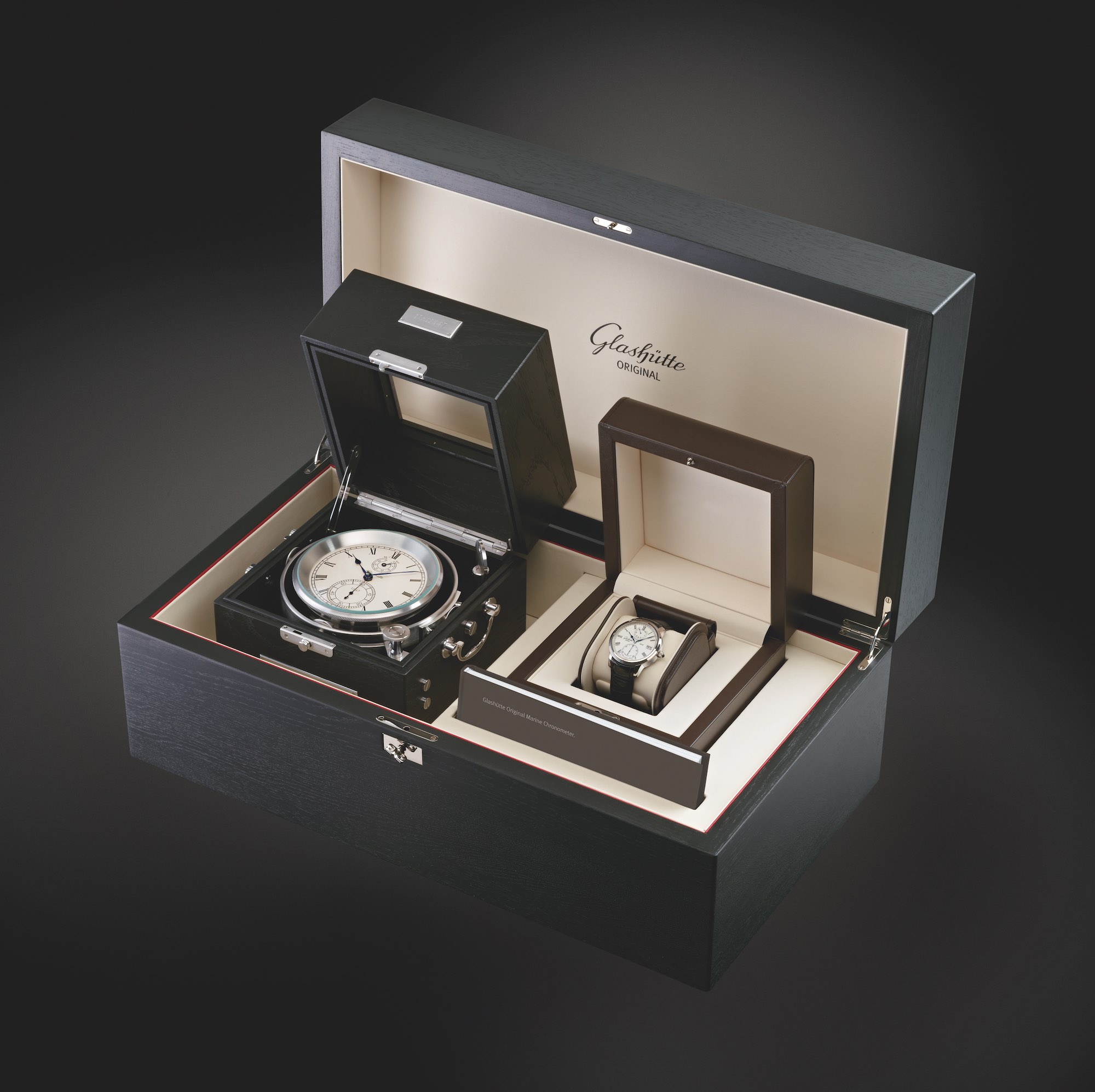
A fortunate find
Just ahead of the opening of the German Watch Museum in Glashütte (co-founded by the town of Glashütte and Glashütter Uhrenbetrieb GmbH/Glashütte Original 2008), thirteen historic Glashütte-made marine chronometers were ‘recovered’ and restored by Glashütte Original. To celebrate the lucky find, in 2010 Glashütte Original decided to create a collector’s package pairing the original and restored marine chronometer in an oak case along with a limited edition platinum model of the Senator Chronometer. The similarities between the ‘recovered’ Glashütte marine chronometers and the Glashütte Original Senator Chronometer – excluding the anachronistic Panorama Date window – emphasize the historical ties that Glashütte Original has vindicated since it was acquired by the Swatch Group in 2000.
2016 version vs. previous Senator Chronometers
To date, the Senator Chronometer has appeared in non-limited editions in 42mm rose gold and white gold cases with white dials and blued hands. The 42mm white gold model we are reviewing today was released in 2016 and has a unique matte blue dial with a grainy surface that radically changes the personality of the watch. It still observes the layout of a marine chronometer, but the shade of blue and the texture achieved on the dial lend it a very different presence.
The market is currently awash with blue watch dials but few of them are as distinguished or as elegant as this particular matte greyish-blue tone that GO’s dial makers in Pforzheim have achieved. Using a blue lacquer base that is grained for additional texture, the markings on the dial are engraved and then galvanised in silver. Silver and dark blue are one of the smartest colour combinations out there and the watch looks crisp and extremely elegant. Compared to the other models with white dials that exude a sense of old-world horology, the blue dial seems entirely contemporary and fresh.
Another more subtle change can be observed on the bezel. Redesigned in 2016, the bezel loses its thicker proportions and adopts a thinner frame, like that found on the Senator Chronometer Regulator. It might not seem like a big deal, but the slimmer bezel is more elegant and means that the dial is larger. Another tiny tweak that goes a long way in allowing the watch to breathe is the incorporation classical lugs (instead of interagted lugs) creating a space between the strap and the watch case. As with all the white gold used by Glashütte Original, the higher proportion of palladium in its content results in a lighter colour that does not need rhodium plating: an advantage because the case can be polished.
The paradigm of a marine chronometer dial
Original marine chronometers had a distinctive look and tended to feature a small seconds sub-dial at 6 o’clock, large Roman hour numerals, a railroad chapter ring for the minutes, pear-shaped hands, and a smaller sub-dial at 12 o’clock to indicate the power left in the barrel. The Senator Chronometer is a faithful reproduction of the layout of a typical marine chronometer dial – excluding the large Panorama Date window, of course.
The two sub-dials are slightly recessed adding more depth to the dial and the power reserve indicator skirts around the Roman numeral XII. This lovely detail means that the Roman XII remains intact and on the same level as the other numerals on the dial and has not been lobbed off at the bottom like the numerals V and VII. To set the time or the date, a handy day/night function is positioned inside the power reserve counter changing at 6 am and 6 pm from white to blue, while the all-important status of the watch as a chronometer is engraved just above the axis of the hands following the curve of the counter.
The distinctive Panorama Date display, which jumps ahead precisely at midnight, is placed at 3 o’clock and features a blue background to match the dial. The secret of its exceptional legibility lies in the mounting of two concentric display discs on the same level, which makes it possible to present the two date numerals without the need for a central separation bar. Instead of the rectangular window that frames the complication on Pano watches, the date window on the Senator Chronometer features a double-bevelled frame and soft, rounded edges. The contrast of the matte blue background, the silver markings and the elegant white gold pear-shaped hands conspire to create an exceptionally legible dial.
Calibre 58-01 Chronometer
This might not appear to be the most complicated of Glashütte Original watches, but the action below deck and its official chronometer status set the Senator Chronometer in a category all its own. The innovative stop-seconds/reset mechanism with minute detent makes it much easier to synchronize the minute and seconds hands when setting the time. When the crown is pulled, the time display is stopped and the seconds hand zips back to zero and stays there. Simultaneously the minute hand advances to the next full minute. When the crown is turned to set the time, the minute hand stops on the full minute guaranteeing the correct relationship between the minutes and seconds displayed. In other words, the watch can be set to the exact minute and second, as befits a “Made-in-Germany” chronometer. Another detail that speaks about the precision nature of this watch is the tiny click you can feel for every minute when turning the crown.
The sapphire crystal caseback reveals the beautiful manual-winding calibre 58-01, complete with the classic three-quarter plate with Glashütte stripes, the hand-engraved balance cock, screw-mounted gold chatons, blued screws, galvanized surfaces, bevelled edges, perlage on the base plate, the swan-neck fine adjustment and a planetary gear train for the power reserve display. Oscillating at 28,800vph, the running time is of 44 hours and 40 minutes.
Only two watches from Glashütte Original boast official chronometer status: the Senator Chronometer and the Senator Chronometer Regulator. The branch of the German Calibration Service (DKD) that undertakes the chronometry tests is located in Glashütte in the restored astronomical observatory where tests are conducted over a period of 15 days. Unlike the Swiss chronometer agency COSC, which tests uncased movements, DKD tests the cased watches and requires that every chronometer can be set to the second – hence the stop-seconds/reset mechanism.
Thoughts
With its 42mm diameter and case height of 12.47mm, the watch is actually a few millimetres thicker than the pre-2016 models. However, the curious thing is that the redesigned bezel and the combination of a dark blue dial and white gold make the watch look smaller and slimmer than it is on paper. It is after all a mini marine chronometer and something smaller would not have captured the sturdiness of the historic timekeepers. The blue tone of the dial is in a league of its own; it is refined, elegant and sober and the contrasting silver markings make it eminently legible. I am a fan of the Panorama Date window and although it might be an anachronism given the marine chronometer styling of the watch, it is an important part of Glashütte Original’s identity.
The Senator Chronometer in white gold comes with a handsome blue alligator leather strap. The model we reviewed for this article comes with a white gold folding clasp and retails for EUR 27,200 although there is also the option of a white gold pin buckle EUR 25,100. For more information, please consult www.glashuette-original.com.


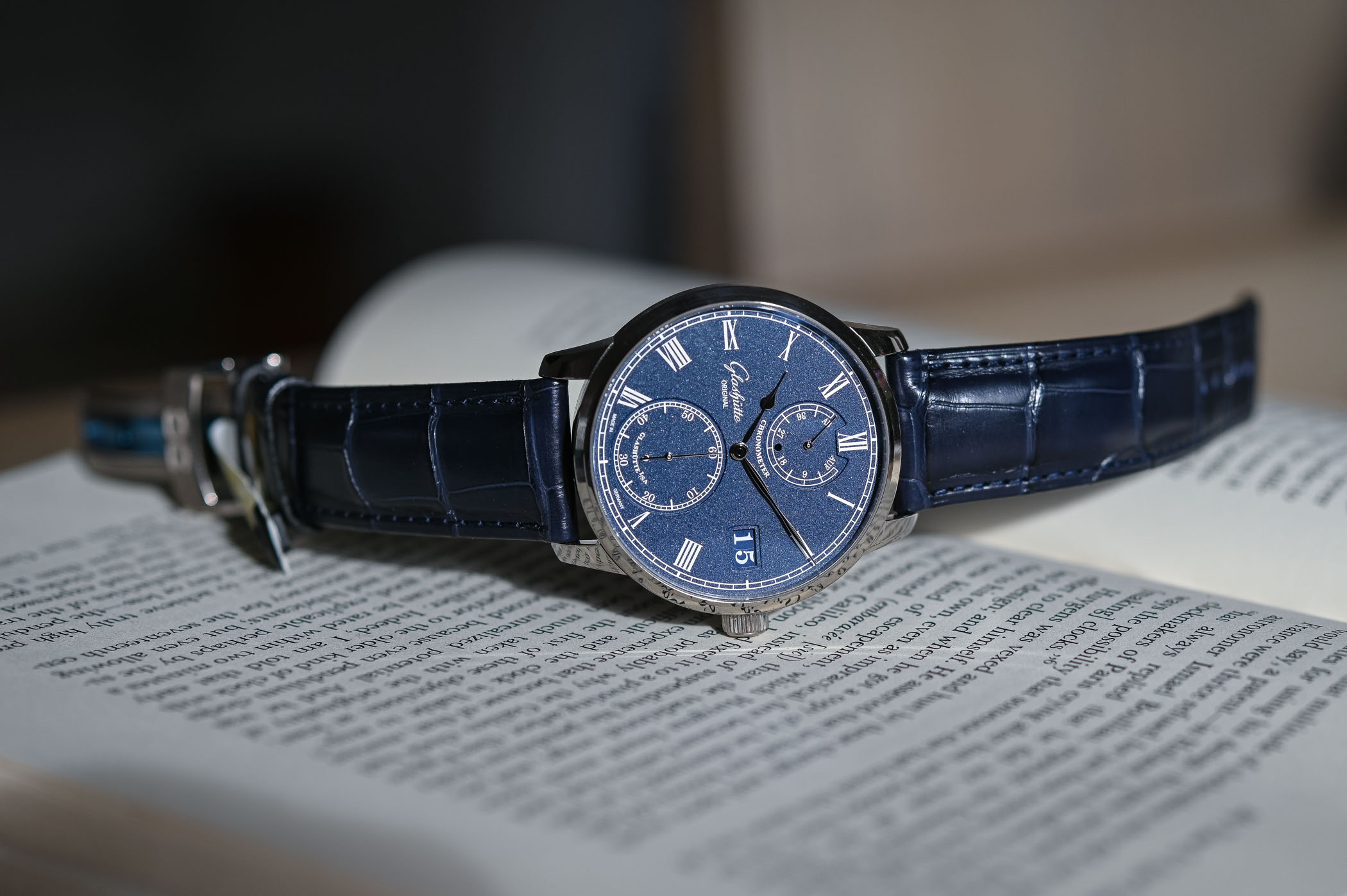
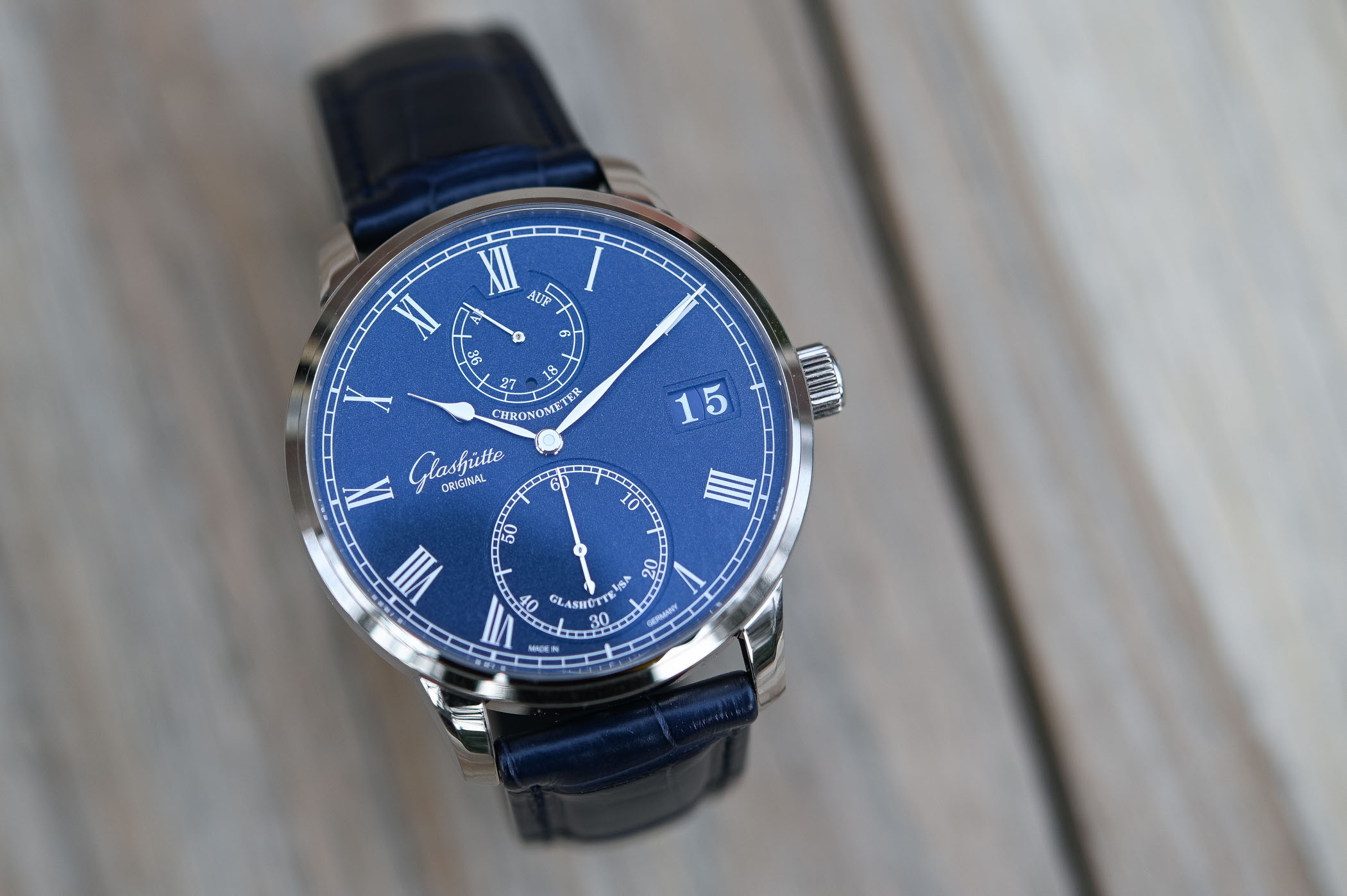
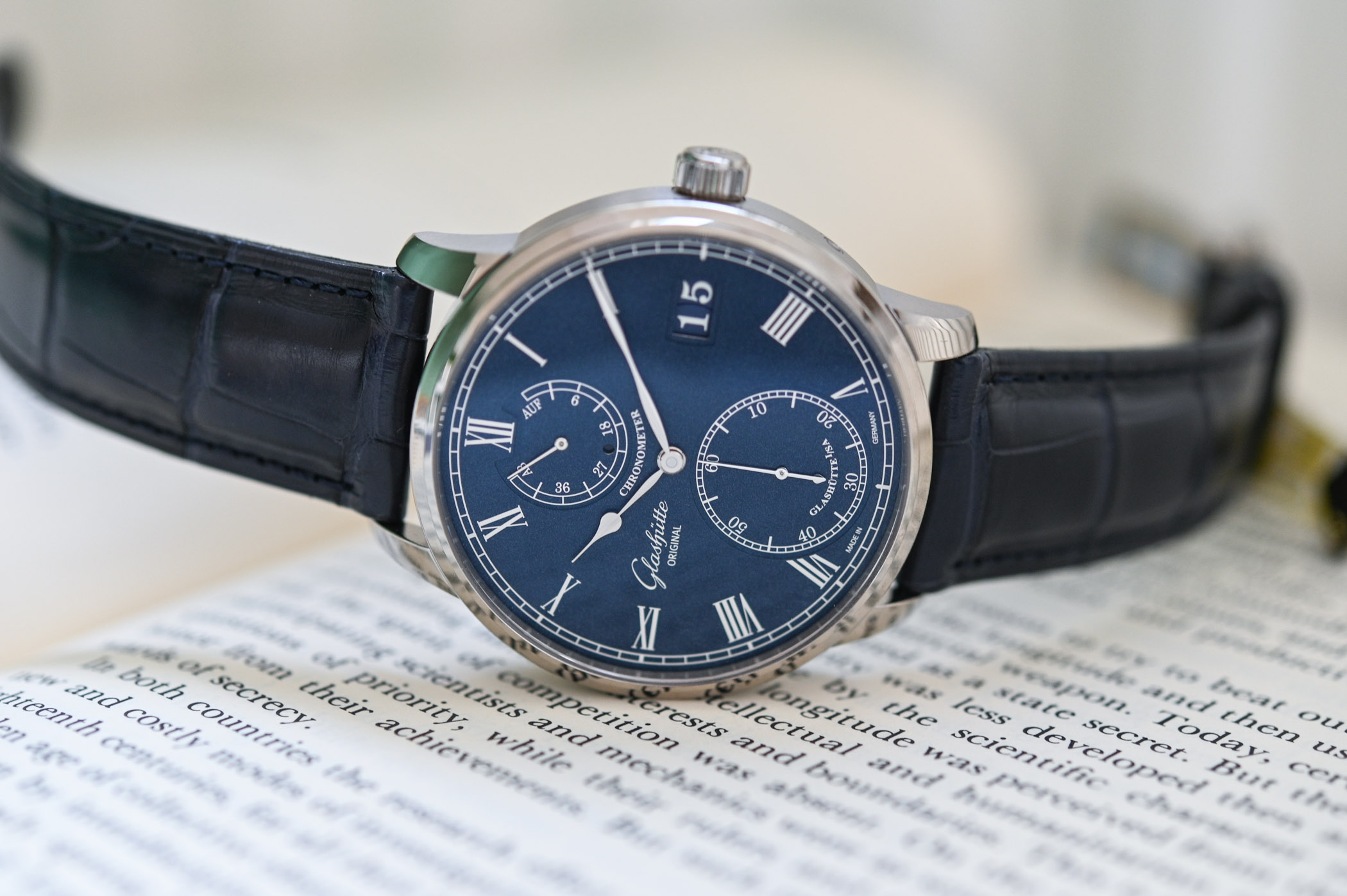
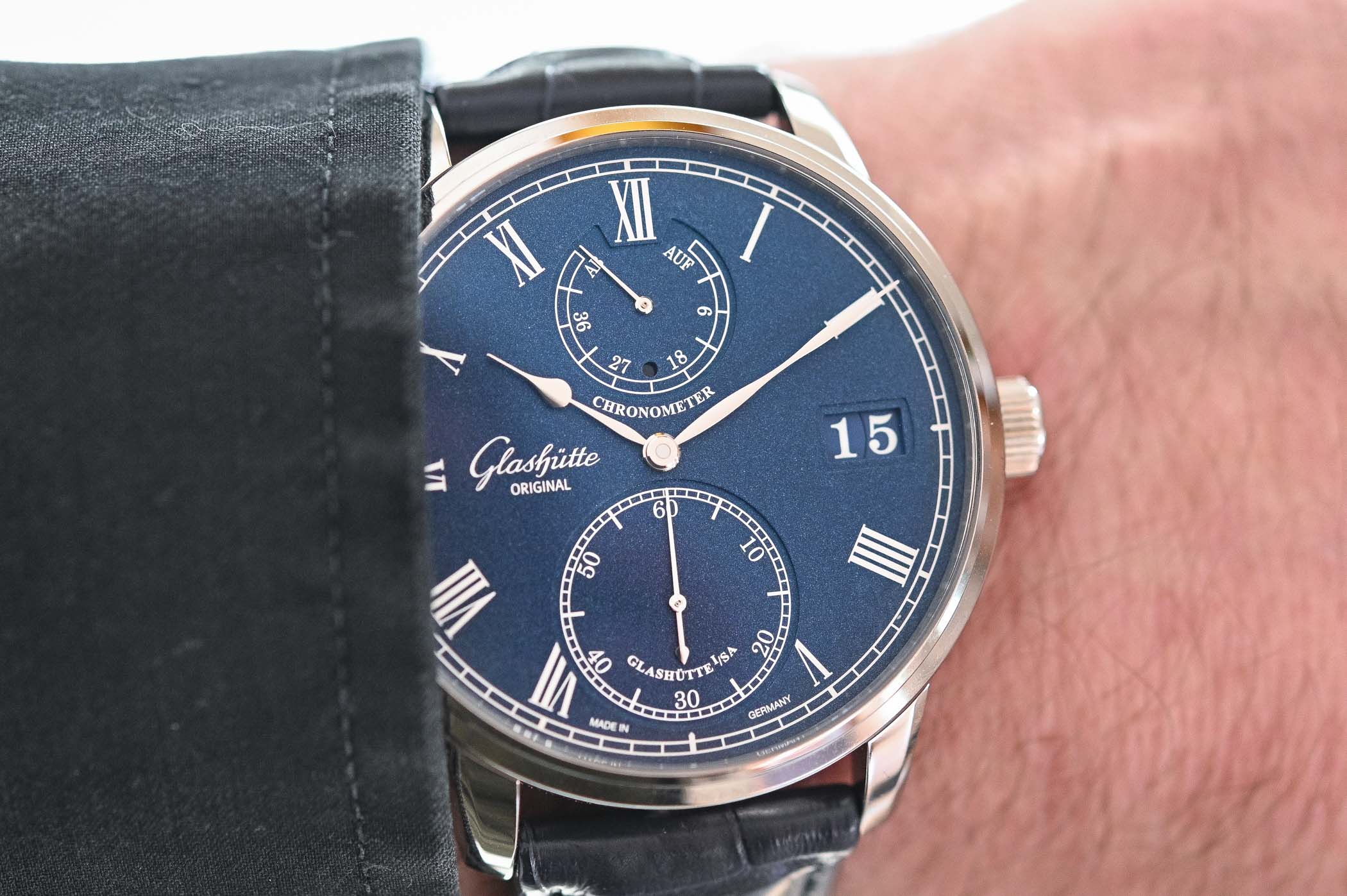

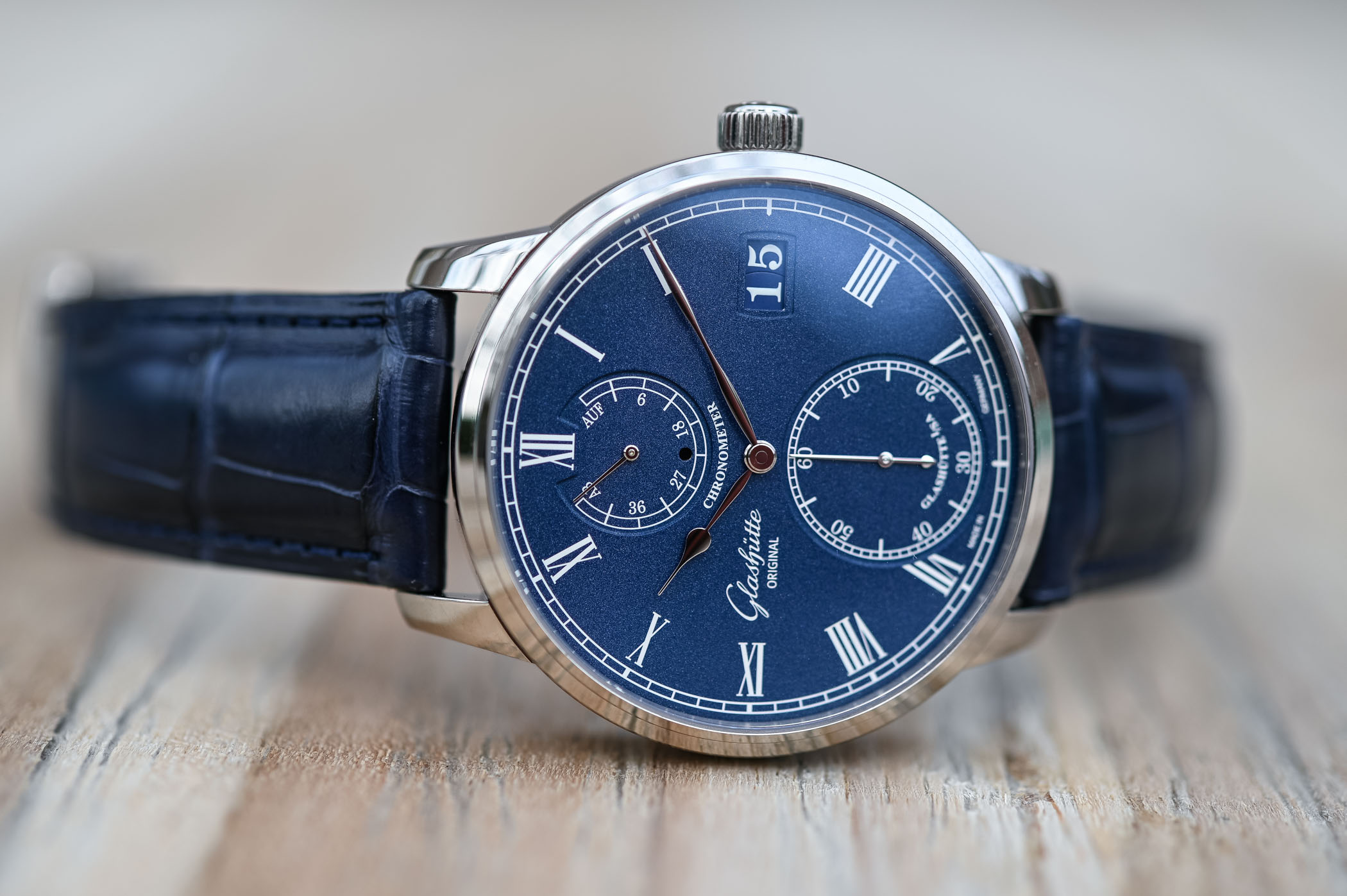
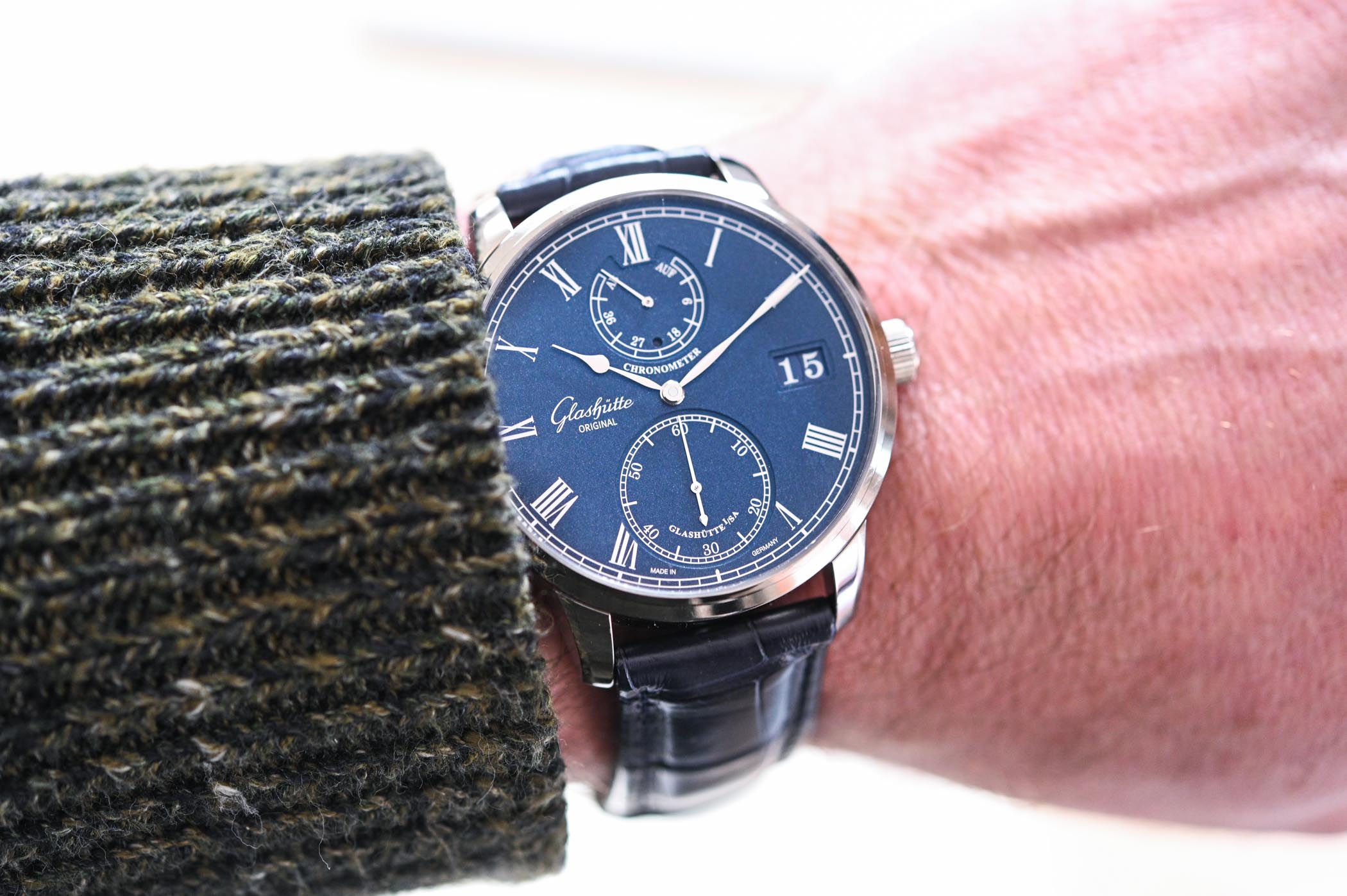
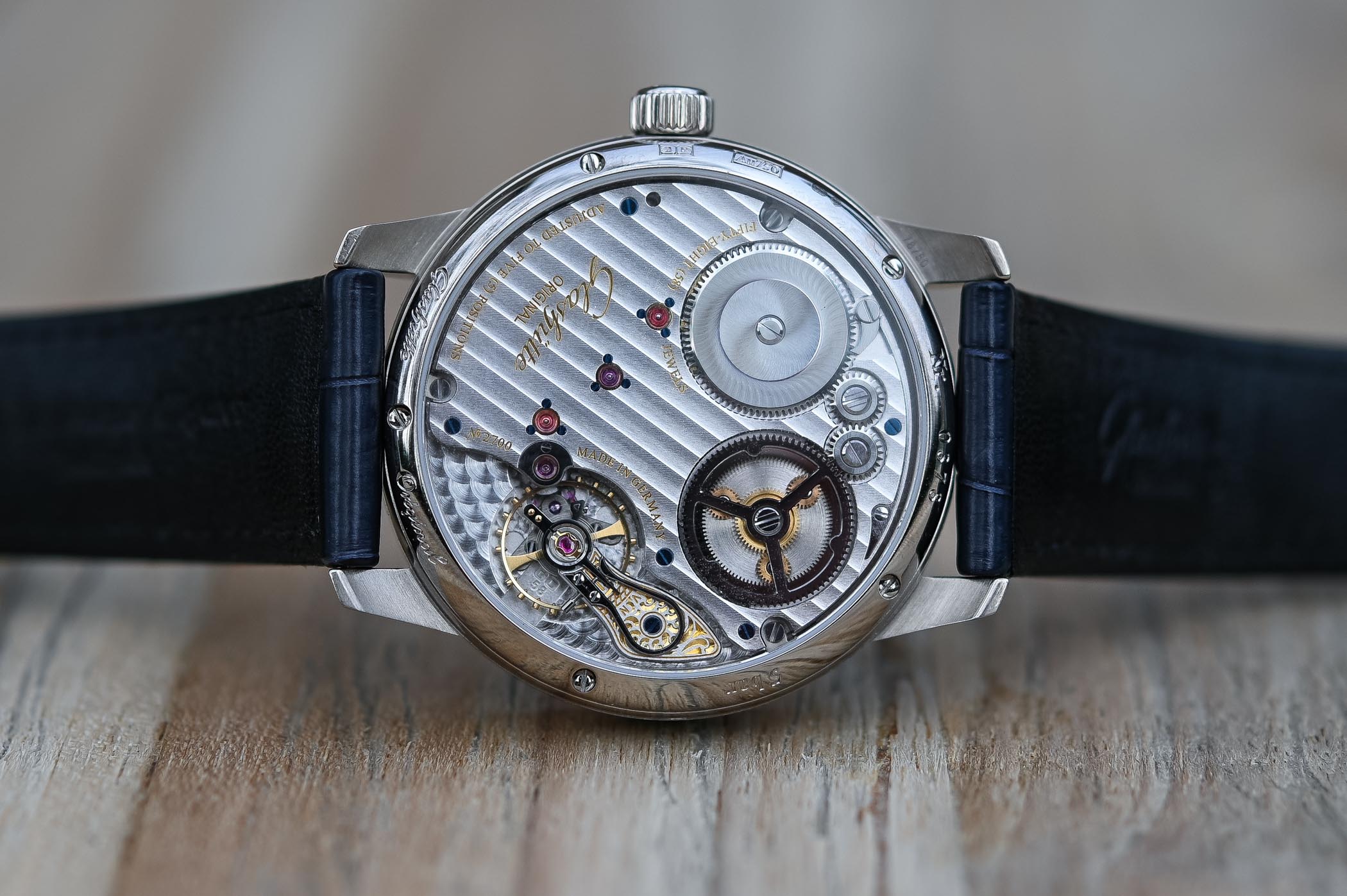
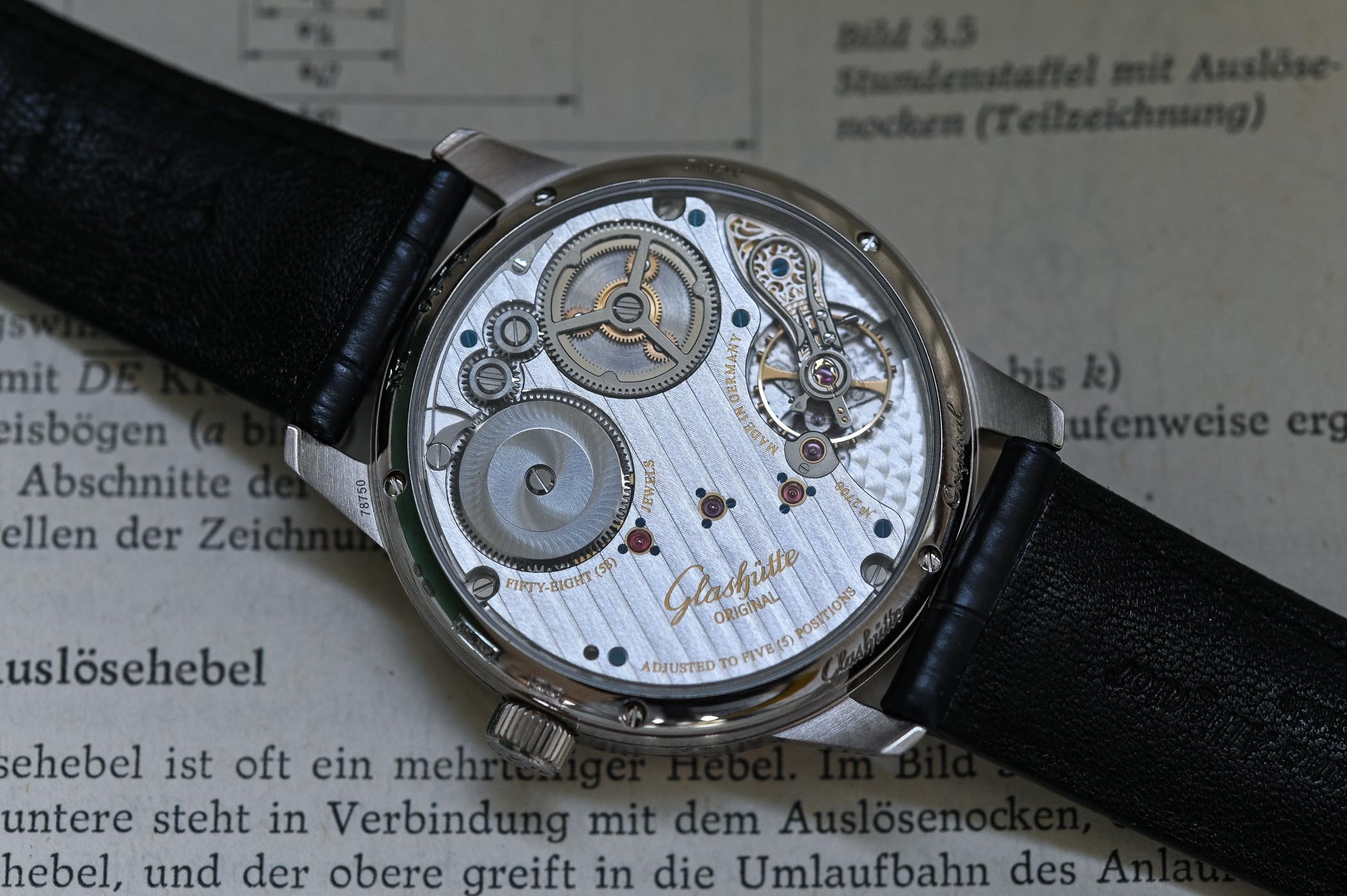
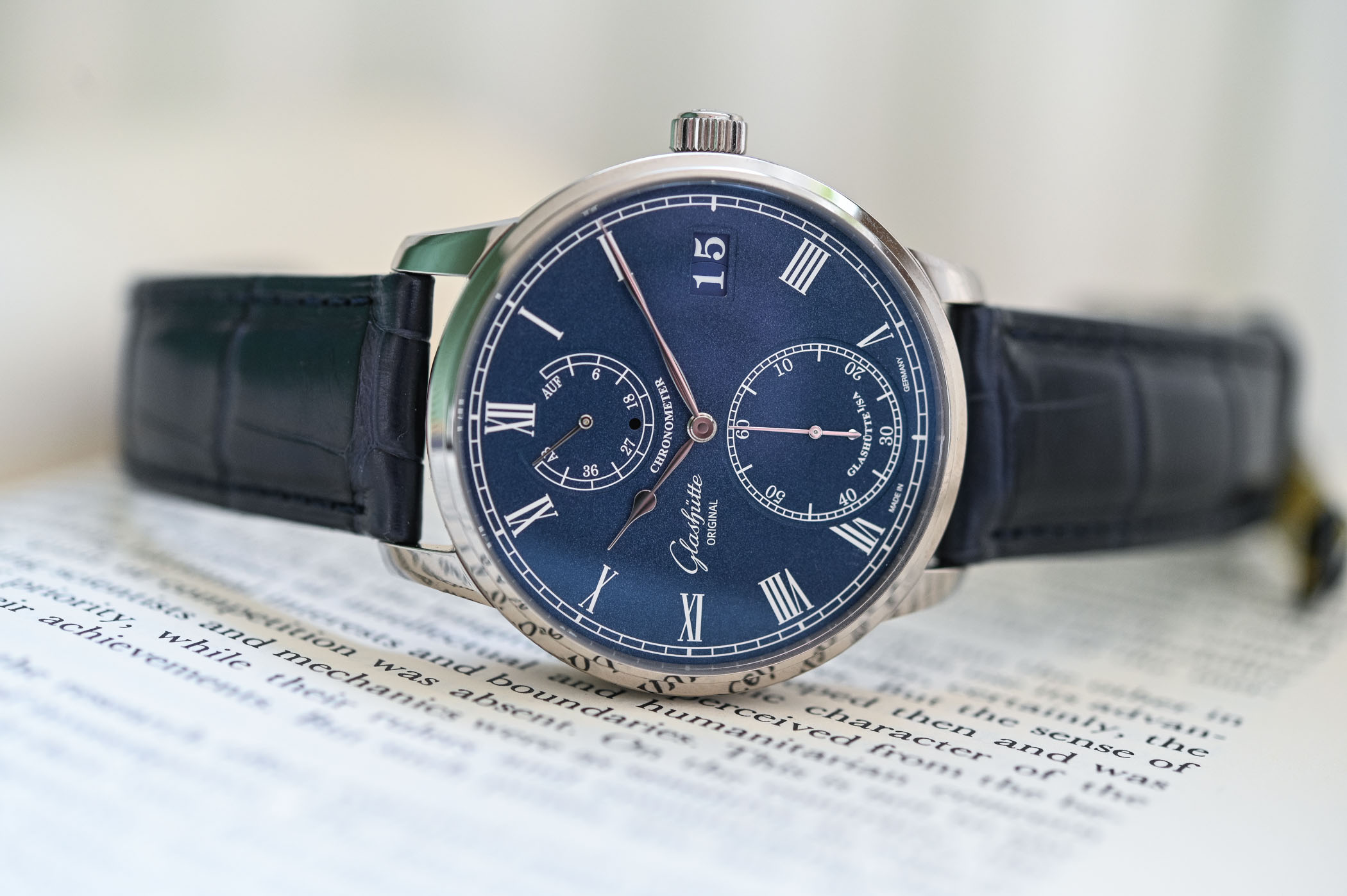
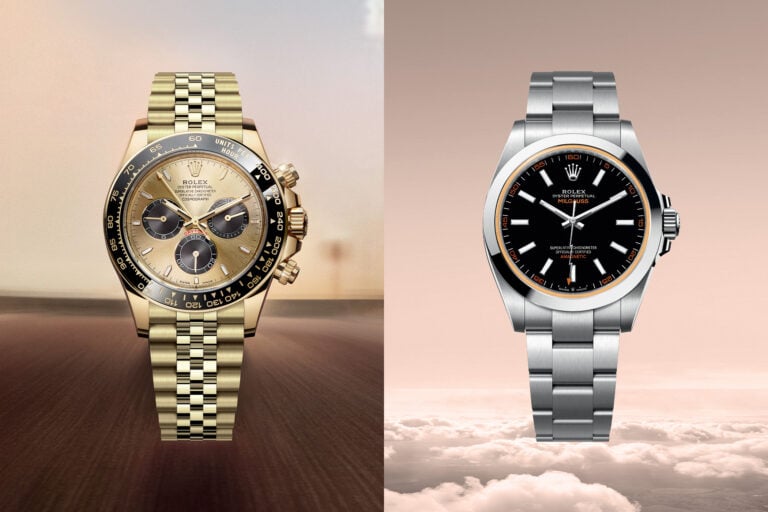
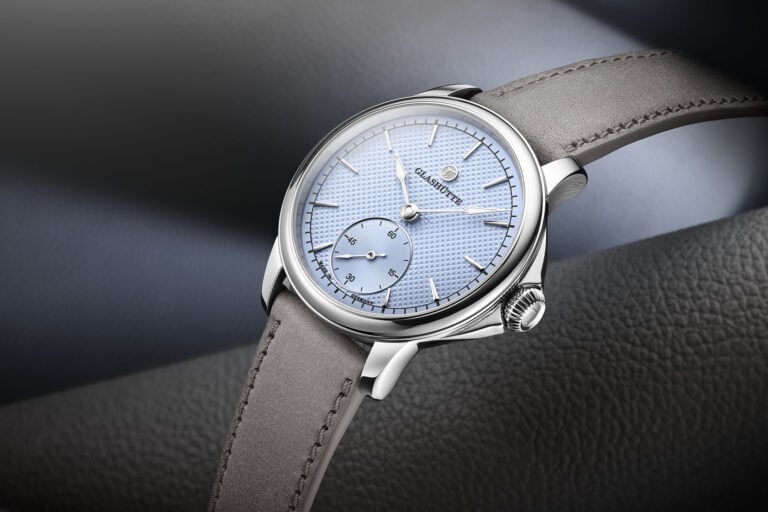
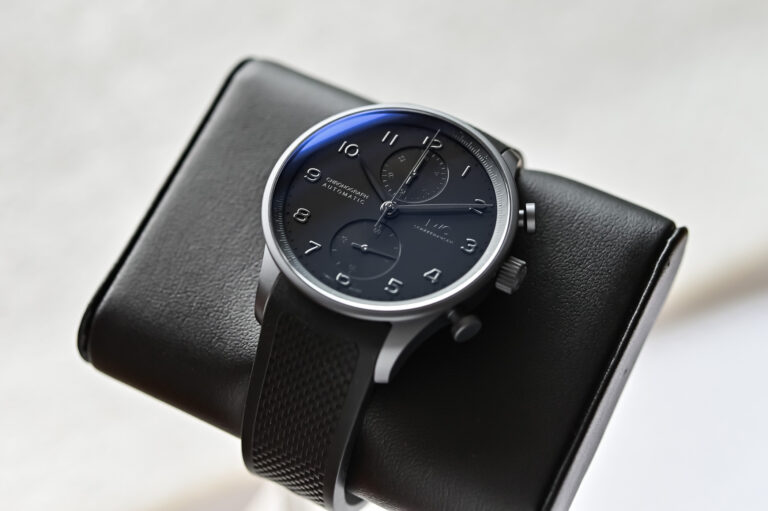
9 responses
It’s a beaut. And look at that movement with the gold chatons and blued screws.
Absolutely love it. from the first time I saw the red gold version on Monochrome I became obsessed with it. I finally got it last Christmas. Monochrome is responsible for 2 Glashuttes I discovered here and bought, the observer and the chronometer. You guys should ask for referral fees from GO 🙂
I guess in this price range, most people would prefer watches with simpler functions but better finishing. But for sure this is a nice watch.
GO makes some of the best “large dates” in the industry, only second maybe to H Moser.
Very, very happy to hear that JD 🙂
And the fact that you enjoy reading us is enough!
Well Brice, Monochrome will always be the first watch blog i read for a long time. You know what they say about first times ??
Thank you and the rest of the team for the great articles and the wonderful blog.
@Brice Count me in! Xavier and your articles have also convinced me to get the UJ 1140L.
@JD – once again, huge thanks !!!!
@Chia-Ming Yang – That’s one veryyyyyy nice watch you have! As with JD, always a pleasure to read such comments.